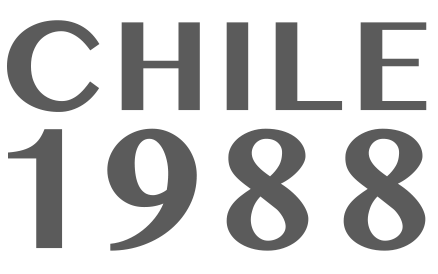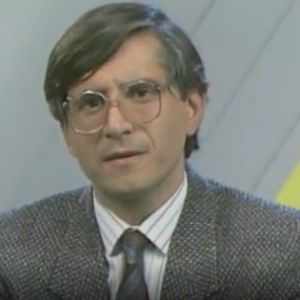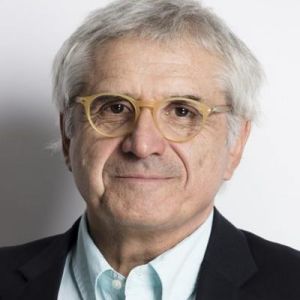Many people wonder, “and how was this genius that was the campaign achieved?” It was not, this was not the action of a small group, an elite group of publicists. Here behind the No campaign, many people participated. Many, many people including creatives, advertisers, who work in advertising agencies, film directors, television people, intellectuals, actors and actresses, scriptwriters, cartoonists. Remembering me, and what was incredible, is that all these people came to the house where we produced the campaign and they came with an idea, or they came with a proposal. Sometimes some even came with small ready-made productions. He produced, for example, many comic gags, a group of actors got together, got a camera, someone to film it, and they came up with this proposal. It was like, a very bottom-up position, because then the time came when the directors, who were Ignacio Agüero, Juan Forch and Eduardo Tironi, had and especially the first one, Ignacio, took all this material and began to choose and give it shape, give order But the amount of material that sprouted, let’s say, was enormous, and everything and everything, very convergent. That is, everything, everything, let’s say, as if obeying the same brief. And that is a question that also gave me confidence. In other words, it seems that he touched on a very profound question that is common to all of us, which was this notion that joy is coming. There is this positive optimistic vision. So, this was not an enlightened group about the campaign, but rather a much more massive phenomenon, many more people at that time, many more people.
Yes, it happens to me that today I see the clip of No, of the song and I think I recognize 80 percent of the people who appear. To this, the person who worked at Filmocentro, is a lady from the Florida Women’s House. This is my sister-in-law. She, this is… Eduardo, he’s a television man. He was a television director from a very young age. So, he would say “15 minutes is a long time in television.” Today is an eternity, but even then, it was a long time. So, he said here we don’t have to make a commercial spot but we are afraid to make a television program. And that was a very important thing. And that was not easy to achieve, because all those who participated were people who came, either from documentaries or from the cinema, especially documentaries, or they came from the world, from, from commercials, let’s say, from commercial advertising. In other words, they did not have this idea of the rhythm of television and Eduardo was a great contribution and there is a key decision, it was Patricio Bañados, to have an anchor person, let’s say no, to spin all this for us, very interesting. And perhaps at that time I didn’t even value it as much as I value it today or later, because Patricio was already a well-known person, a person who had a very high prestige, as a correct, dignified, fair-minded, rational person. He had taken a relevant step by saying I was going to be the face; “I am going to act as the face of the No.” It had not been easy to convince him to give it. What he had in him, in the sense, was a contract to do this, but. But he was taking a lot of risks. So, he kind of put a condition, maybe not explicit, but tacit, the condition was, “I’m not going to do anything I don’t believe in.” That was the basic condition.
Second, we arrived, I was in charge of the scripts, of the scripts by Patricio Bañados that we gave him with Javier Martínez especially. So I would arrive at the place where we recorded Patricio Bañados, which was a house around Diagonal Oriente, and I would arrive with my script. This is what you have to record today. We would give, I don’t know if every day, but almost every day, and Patricio Bañados would take his pencil and begin to intervene in the script, to delete or comment on things, and I was very surprised because it did not seem to me that he had the authority to do it. Why? well, this had been the result of great discussions of great negotiations, and he came here and began to change it. Well, but then we recorded and recorded it was a magical thing, because on the one hand all the changes to it were, they improved, the text. First of all, that is, they were a contribution. But the second thing, and the most impressive thing, is that the way he said it had so much strength, so much credibility, it had so much texture, so much, so much subtlety, that it transformed that it was almost a magical effect on the text. It made the original text, already intervened by him, a kind of poem, actually. It was impressive, impressive. In this sense, the contribution of Patricio Bañados was endless.
They were very important in the campaign, something that today one sees and seems insignificant. But the presence of these American actors and actresses reminds you, this Varetta, Jane Fonda. A phrase that we used from Claudio Arrau, who was actually speaking in general about the importance of Human Rights in democracy, and we used it. This character that, I remember, had been Superman. All of this was very important because they made us Chileans feel that we are supported. That there were people in the world, important people, who were watching what was happening here. In that sense, we were not alone. That was one, look, that too again, they were contributions that were arriving. Whether it was Juan Gabriel Valdés, Patricio Silva, friends called in San Francisco or people like that, or Ariel Dorfman, who knew someone around here who was in contact with Jane Fonda, like that. And suddenly he would appear, someone would say “look, we have something from Jane Fonda” and he would arrive and we would put it on at the last minute. No, it was all contributions, just like that, spontaneous.
There is a date that was extraordinarily important, extraordinarily important on the one hand, because it was unexpected. Nobody imagined that the strip of No after the story we had was going to use humor. And the second, because the humor was also very disconcerting. It was unexpected. Humor allowed us to say things that we couldn’t say otherwise. Practically with respect to Pinochet, like the thing about La Perla in the tie. In other words, irony and sarcasm, were the way to circumvent censorship and to say things about Pinochet that we wanted to say. We were very interested in placing Pinochet as our focus, as our adversary. More than the Yes, it was Pinochet. And the other effect that humor had is that it also restored our confidence in people. That is, it was, it reduced fear, that is, it kind of de-dramatized. We were very interested in de-dramatizing this. To show how the act of voting was much more ordinary, much more, much more within reach. If it is enough to put a line, because otherwise if we present it as something too epic, people were going to think twice and eventually not go to vote.
It is that note that, curiously, on the day of the plebiscite I have quite like quite erased. I mean, I haven’t erased it, I remember getting up very early, very early and, in a car that I had an old one, a Renault, having parked very far from Diego Portales, about 15 blocks away, because we were afraid that they would leave to produce, riots or military movements could occur in the center, so it was better to stay far away. And I went to settle the day I visited the place I had been assigned, which was a, a kind of press office that we had right in front of Diego Portales, where the official press was and where the votes were counted. and a few meters from the command at that time we had special offices where the foreign journalists arrived and my job was to listen to the news, to watch the news and I wrote press releases that gave me instructions from the command, that is, from the political command, and I wrote statements that I delivered to journalists. That was my work all day, I went out to vote at around twelve o’clock. It was an impression for me to see how many people were voting. That was a very good sign. And then it would come back to me, to my function, and I practically didn’t move from there until very late at night. And the people began to crowd around the command to celebrate. I went, I was there for a few minutes and I don’t know, something happened to me that always happened to me in this type of event, I’m kind of reluctant, like going up on stage in photography, let’s put it that way, and I that my temptation was to go home. And that’s what I did. I went walking that night to look for the car. As I was saying, I was very far away, and I went home. I lived in the Reina Alta, far away, with a very deep feeling of having, of having, of having closed a stage in my life. In other words, the feeling of having paid a debt with the Chilean people, with Salvador Allende, and that it was beginning and that I had to go back to, I had to resume my life, my life.
I had abandoned everything for the plebiscite for two years before, I had abandoned my study and I had also abandoned my professional career, yes I had to restore that. Well, and so it was. The next day I got up early in the morning and went to report to the place where I had worked and that I had had a leave, let’s say, to be able to dedicate myself to the plebiscite. An institution, an NGO called Sur. And there I arrived and said here I am, I come to recover my place and my office. And well, everyone is speeding up, everyone hugging each other. And this is in José Miguel Infante, almost on the corner of Providencia. And we began to see that people spontaneously began to fill the street, and Providencia walking towards the center. So what we did was at that moment, let’s say, all of us from the south go out into the streets and join the march. And that was a moment. That was the moment of celebration. That was the great moment of the celebration, the 6 in the morning, the 6 type 12 a day. We had had as a celebration before within the strip. Since the strip ended three days before, more or less on October 5, and we also, it was delivered to the strip, it was delivered to the tape with, as if I remember correctly, 48 or 24 hours in advance. We had already delivered the last strip about 5 days ago and there had been a celebration between us. Also like me, a celebration, we were satisfied, we thought we had done a super good job.
We had a focus groups system that allowed us to evaluate how the campaign was seeing, how it is perceiving, and the results were positive. In addition, we had realized the commotion that had been caused by, how people were grouped in homes, in bars, in restaurants, in places in front of the, in front of the screens, in department stores, at look at the campaign. And also, like everyone else, he was humming the song. Then we had realized that this had hit, it had moved people. So we were happy, we were satisfied. Although we always had, I also commented on it in the book, during the first two or three weeks, two weeks, I think one always has doubts because there was such a contrast between the No and the Yes bands, it was like, there were two approaches so different one from the other, that suddenly one would have doubts if perhaps we were not the wrong ones, if we were not sinning as naive, innocent, if we were not being too poetic, yes, too positive. And perhaps this other, experts we knew were great campaign experts, Argentines, who had directed a lot of political advertising, who knew how to handle negative propaganda. If perhaps they would not be right, if that question we always asked ourselves. Well, in fact, within the Concertación itself and within the political leaders, there were many who questioned us. But towards the end of the campaign we already had the feeling that no, that we were right that we had triggered a process among Chileans of identification, of self-respect, of pacification, of reunion. We had, we had hit a very deep element in people. And that this was going to translate into the triumph of No. After a month or so, I think I think less than a month, if it could have been three weeks, four weeks after October 5, I left precisely for Notre Dame with all the family. I went to write my thesis that had been pending. I mean, with this feeling: I already did what I had to do, I dove in and concentrated on this. I broke completely with Chile, I did not maintain any contact, any link. It was very important as a repair, like, like, like regaining perspective, and I started another phase of my life. And in fact, I am going back to Chile to work in the South and my intention was to continue working in that NGO as I had done before and in a competently accidental way. I joined the Aylwin government, as director of communications, it was totally accidental. In other words, just a short time before the government was formed, he called me, Patricio Aylwin called me to ask me to participate in this. Well, that’s a bit of my story.


